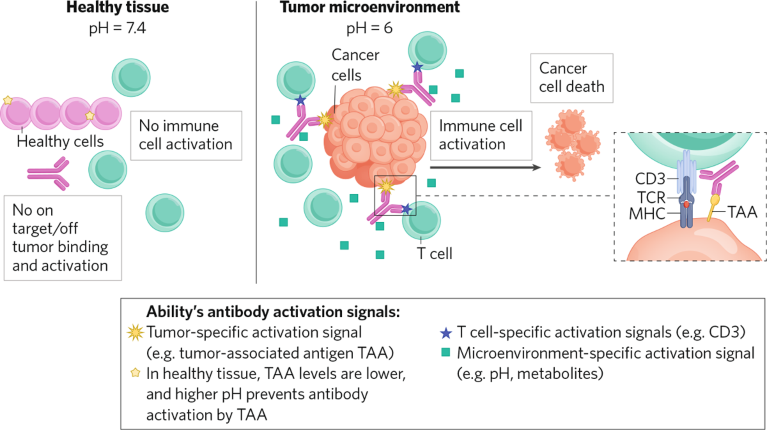By combining one of the world’s most comprehensive antibody–antigen datasets with powerful generative artificial intelligence (AI) and in vitro screening, biotech company Ability Biotherapeutics is creating innovative logic-gated multispecific antibodies that activate only under defined disease conditions.
Although traditional immune-engaging antibody therapeutics have shown tremendous potential, most lack specificity. In cancer patents, as an example, this can lead to unintended side effects such as on-target off-tumor toxicity or cytokine-release syndrome that can spiral out of control and potentially lead to death.
Ability’s solution to these serious limitations is to engineer antibodies that activate only in the presence of disease-specific signals, such as an acidic pH, a specific metabolite, or a particular combination of antigens (Fig. 1). The exceptional selectivity that results enables precision therapeutics with safer and more-effective treatment profiles for addressing the significant unmet medical need in solid tumors, which account for around 90% of adult cancers, as well as in autoimmune diseases.

Fig. 1 | AbiLeap is a unique platform that combines generative artificial intelligence and in vitro screening with deep drug development expertise. Ability’s antibodies activate only in the presence of disease-specific signals to induce cytotoxicity. CD, cluster of differentiation; MHC; major histocompatibility complex; TAA, tumor-associated antigen; TCR, T-cell receptor.
AbiLeap: AI-guided discovery at scale
At the heart of the company is AbiLeap, a unique platform that integrates generative AI, in vitro screening, and in-depth drug development expertise. The foundation of the platform is the company’s considerable, exclusively held, and therapeutically relevant dataset of human antibody sequences, which currently contains 4 billion datapoints and is continuously expanding. “It is one of the largest, most comprehensive databases of antibody–antigen interactions ever constructed, aggregating over five years of curated drug discovery data from both public and proprietary sources,” explained CEO Giles Day. “What further sets the database apart is that it contains both negative and positive binding data, to fully inform high-resolution models.”
Trained on this therapeutic discovery dataset, Ability’s generative AI models can rapidly design antibodies with exceptional selectivity for immune cell targets or tumor-associated antigens. These candidates are then tested to confirm their context-dependent activation and function.
Because clinically relevant properties such as stability, manufacturability, and low immunogen-icity are already built into the design of the platform, this powerful approach delivers therapeutics much more rapidly than traditional approaches. “What is transformational is that we can systematically and rapidly generate logic-gated antibodies, all of which are designed with therapeutic applications in mind from day one, prioritizing rapid translation to the clinic,” said Day. Use of simple immunoglobulin G (IgG)-based formats compatible with standard manufacturing further differentiates Ability, allowing the company to sidestep development risks and manufacturing complexities that often plague other more complicated modalities.
With these design principles and the goal of delivering highly differentiated therapeutics with improved therapeutic indices, “AbiLeap furnishes libraries that are significantly weighted to produce antibodies that exhibit conditional activation and additional desirable properties, considerably increasing the chances of success all while enabling new types of biology and reducing costs and development times.”
Pipeline expansion and strategic partnership
Ability’s mission is to develop innovative, targeted, immune-modulating biotherapeutics to treat patients with cancer and autoimmune diseases. To that end, the company is currently advancing four therapeutic programs balancing best-in-class and first-in-class immune modulators against targets with broad therapeutic applicability.
The company’s lead candidate is Leap 1121, a selective T-cell-depleting antibody that is currently in lead optimization for inflammatory skin conditions such as vitiligo, lichen planus, and alopecia areata. “Once we have obtained our first human proof-of-concept, Leap 1121 could provide therapeutic benefits to a wide array of autoimmune conditions,” said Day. “Tailoring the immune-depletion strategy to highly specific, disease-causing cell populations will avoid the broad immune suppression observed with current therapies”. Also in the company’s pipeline are Leap 1009 and 1030, pH-sensing T-cell engagers, which focus antibody activity to the acidic environment of solid tumors or inflammatory sites of autoimmune diseases. A newly initiated fourth program will focus on dual specific (two in one) therapeutics.
An open and collaborative company, Ability is seeking investment partnerships and scientific collaborations to accelerate its growth, co-develop novel biologics using its AbiLeap platform, and advance its internal pipeline to clinical proof-of-concept. “With an unrivalled way of creating uniquely differentiated, potent, ultra-targeted biotherapeutics, we are redefining how immune modulators are designed,” said Day. “Our logic-gated antibodies offer a step-change in precision biotherapeutics, promising to unlock new frontiers in solid-tumor immunotherapy and selective autoimmune disease treatment, bringing hope to patients and their families.”


